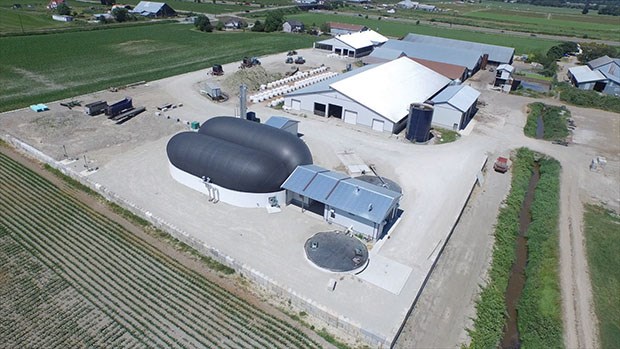A Delta dairy farm’s efforts to diversify its business are quickly becoming a boon to the environmental bottom line for the community as a whole. Home of the area’s first working on-farm anaerobic digester, Seabreeze Farms Ltd. is leading the charge for a new line of agricultural business.
“The idea of taking the manure and pre- and post-consumer waste to make renewable energy and high quality fertilizer, that’s what excited us as a family,” says Jerry Keulen, owner of Seabreeze Farms Ltd.
While the inspiration for building an anaerobic digester started with the vision of selling renewable energy to Fortis Energy, it quickly became apparent the technology could help capture other opportunities.
Ultimately, it is helping put this Delta dairy farm ahead of the curve in adapting to changes in weather patterns and water availability caused by climate change.
“It has got to be on our minds. The climate is changing, so how do we think long-term, how do we work with that? We are seeing hotter, dryer summers. In the fall, storms come in a little earlier and are more severe,” says Keulen. “We have to be aggressively seeking ways to deal those changes as they come our way.”
The process uses all of the manure and farm waste produced by the family’s dairy farm, allowing them to recover water and valuable nutrients like phosphorus and nitrogen. After processing in the digester, the remaining material, known as digestate, is odourless and can be used on the fields to fertilize crops either as a dry solid or liquid “tea.”
The dried digestate is worked into the soil in the spring, replacing the need to spread raw manure. Drawing off the methane for biogas production eliminates the characteristic manure odour, and capturing phosphorus prevents excess nutrient build up in the soil or run-off from the fields.
In the summer, the liquid digestate is particularly useful as fresh water resources become increasingly scarce.
“Water recovery is a real advantage for us now. It’s a good way to feed the crops in a dry part of the summer,” explains Keulen. “There is still good nutritional value in the water that we recover from the digester, so it takes the place of irrigating our grass and corn fields with fresh water.”
In 2013, the B.C. Agriculture & Food Climate Action Initiative worked with agriculture producers and government staff to develop a regional adaptation strategy, identifying specific issues and actions to help Delta farmers deal with the impacts of climate change.
Since then, the Delta Farmers’ Institute, with support from Delta council, has been leading a coordinated effort to address issues like irrigation and drainage.
“As a group of farmers invested in the health of our community and our industry, the Delta Farmers’ Institute has made it a priority to be proactive in how we address climate change impacts,” says president David Ryall. “When we ask the big questions or test new technologies and practices, it helps everyone move towards doing things better.”
Projects like the anaerobic digester at Seabreeze Farms demonstrate the ability of farmers to play a proactive and positive role in addressing the climate change challenges of the entire community.
“It’s an exciting time. We don’t want to be reliant on chemical fertilizer all the time, and this is another avenue of taking organic consumer waste that would have gone to the landfill and making a high quality crop fertilizer from it,” says Keulen.
“Methane is renewable energy. We capture it, purify it and then it goes straight into Fortis’ line. There is a real demand for renewable energy from both homeowners and businesses.”
“It’s a lot of work and there are a lot of expenses with it. There are ups and downs, but in the end we know we’re doing the right thing,” he adds.
The B.C. Agriculture & Food Climate Action Initiative develops tools and resources to enhance the B.C. agriculture sector’s ability to adapt to climate change. Funding is provided by the B.C. Ministry of Agriculture through Growing Forward 2, a federal-provincial-territorial initiative.



